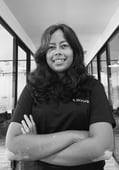Contents
Earnings per share: everything investors need to know
5 minutes read
09 June 2025

When you buy a stock, you want to know one thing: how much money is the company making for each share you own? This question leads us to one of the most critical metrics in investing: earnings per share, or EPS.
What is earnings per share?
Earnings per share represents the portion of a company's profit allocated to each outstanding share of common stock. Think of it as your slice of the company's profit pie. If a company earns $10 million and has 1 million shares outstanding, each share represents $10 of earnings.
The earnings per share calculation has a deeper meaning. It shows how profitable a company is on a per-share basis. This metric helps you compare companies of different sizes and understand which ones generate more profit relative to their share count.
The earnings per share formula is explained.
The basic earnings per share formula is straightforward:
EPS = (Net Income - Preferred Dividends) ÷ Weighted Average Outstanding Shares
Let's break down each component:
- Net Income: The company's total profit after all expenses and taxes
- Preferred Dividends: Payments made to preferred shareholders (these get subtracted because common shareholders don't receive them)
- Weighted Average Outstanding Shares: The average number of shares during the reporting period
Earnings per share calculation example
Let's see the earnings per share formula in action with a real example:
Company XYZ reports these numbers for the quarter:
- Net income: $15 million
- Preferred dividends: $1 million
- Weighted average outstanding shares: 7 million
Using the earnings per share calculation formula: EPS = ($15M - $1M) ÷ 7M = $14M ÷ 7M = $2.00
This means each share earned $2.00 during that quarter.
Why use weighted average shares?
You might wonder why we use weighted average outstanding shares instead of just counting shares at the end of the period. Companies often issue new shares or buy back existing ones throughout the year. The weighted average provides a more accurate representation by taking into account the duration each share was outstanding.
For example, if a company had 1 million shares for six months and then issued 500,000 more shares for the remaining six months, the weighted average would be: (1M × 6 + 1.5M × 6) ÷ 12 = 1.25 million shares.
Types of earnings per share
Basic earnings per share
The basic earnings per share formula uses the standard calculation we discussed above. It represents the simplest form of EPS calculation.
Earnings per share diluted.
Earnings per share diluted accounts for all potential shares that could be created through stock options, convertible bonds, or other securities. This gives a more conservative view of EPS because it assumes maximum dilution.
The diluted EPS is typically lower than basic EPS because it divides the same earnings by a larger number of potential shares.
Earnings per share TTM meaning
TTM stands for "trailing twelve months." Earnings per share TTM meaning refers to EPS calculated using the company's profits from the most recent 12-month period. This smooths out seasonal variations and gives a more stable picture of the company's earning power.
How to use an earnings-per-share calculator
Many online earnings-per-share calculators can help you compute EPS quickly. These tools typically ask for the following:
- Net income
- Preferred dividends (if any)
- Number of outstanding shares
Enter these values, and the calculator will provide the EPS result.
Understanding EPS in different contexts
Earnings per share stocks analysis
When analyzing earnings per share stocks, look for consistency and growth trends. A company with steadily increasing earnings per share (EPS) over several quarters or years often indicates strong management and business fundamentals.
Earnings per share ratio, meaning.
The earnings per share ratio becomes clearer when compared to the stock price. This comparison gives you the price-to-earnings (P/E) ratio:
P/E Ratio = Stock Price ÷ EPS
A lower P/E ratio might suggest that the stock is undervalued, while a higher P/E ratio could indicate overvaluation or high growth expectations.
Earnings per share growth rate formula
To calculate EPS growth, use this earnings per share growth rate formula:
EPS Growth Rate = [(Current Period EPS - Previous Period EPS) ÷ Previous Period EPS] × 100
For example, if EPS grew from $1.50 to $1.80: Growth Rate = [($1.80 - $1.50) ÷ $1.50] × 100 = 20%
The significance of earnings per share
Investment decision making
Earnings per share helps investors make informed decisions by:
- Providing a standardized way to compare companies
- Indicating profitability trends over time
- Serving as input for valuation ratios like P/E
Dividend capacity assessment
Companies with higher EPS generally have more capacity to pay dividends. Growing EPS often leads to dividend increases, making these stocks attractive to income-focused investors.
Market perception
The market closely watches EPS announcements. When actual EPS beats analyst expectations, stock prices often rise. Conversely, missing EPS estimates can lead to price declines.
Limitations you should know
EPS manipulation possibilities
Companies can artificially boost EPS through:
- Share buybacks: Reducing the share count increases EPS even if profits remain flat
- Accounting adjustments: Timing revenue recognition or expense deferrals
- One-time gains: Including non-recurring items in net income
Missing financial health indicators
EPS doesn't tell you about:
- Debt levels: A company might have high EPS but also dangerous debt levels
- Cash flow: Earnings don't always translate to actual cash
- Asset quality: The balance sheet strength isn't reflected in EPS
Industry context matters
EPS has different meanings in various industries. A utility company's EPS of $2 might be excellent, while a tech company's $2 EPS might be disappointing, given growth expectations.
Advanced EPS concepts
Earnings per share accounting standard
Different accounting standards (GAAP vs IFRS) can affect EPS calculations. The earnings per share accounting standard requires companies to report both basic and diluted earnings per share (EPS) when they have potentially dilutive securities.
Earnings per share computations related to IFRS and GAAP
Both IFRS and GAAP have specific requirements for computing earnings per share. Key differences include:
- Treatment of contingently issuable shares
- Calculation methods for weighted average shares
- Disclosure requirements
Making EPS work for your investment strategy
Compare within industries
Don't compare EPS across different industries. Instead, compare companies within the same sector. A bank's EPS structure differs significantly from a manufacturing company's EPS.
Look at trends, not snapshots.
One quarter's EPS tells you little. Look for consistent growth patterns over multiple periods. Seasonal businesses may exhibit quarterly variations that smooth out over a year.
Combine with other metrics.
Use EPS alongside other financial metrics:
- P/E ratio: Shows valuation relative to earnings
- PEG ratio: Incorporates growth expectations
- Return on equity: Measures efficiency of shareholder capital use
- Debt-to-equity ratio: Reveals financial leverage
Consider earnings quality
High-quality earnings come from core business operations, not one-time events or accounting tricks. Look for companies with consistent, sustainable EPS growth.

Ready to own a piece of the world’s biggest brands?
- Invest in 4,000+ US stocks & ETFs
- Fractional investing
- Zero account opening fees
- Secure and seamless
Start investing in just 2 minutes!

Build your global portfolio.
.png)
Invest in companies you love, like Apple and Tesla.

Track, manage, and grow your investments.
Practical Tips for EPS Analysis
Use multiple periods
Analyze EPS over various timeframes:
- Quarter-over-quarter for recent trends
- Year-over-year for seasonal adjustments
- Five-year periods for long-term patterns
Watch for red flags.
Be cautious when you see:
- Volatile EPS swings without clear business reasons
- Heavy reliance on non-recurring items
- Significant differences between basic and diluted EPS
Stay updated with earnings news.
Follow earnings-per-share news for companies in your portfolio. Quarterly earnings announcements can significantly impact stock prices.
Earnings per share remains one of the most valuable tools in your investment toolkit. While it has its limitations, understanding EPS helps you make more informed investment decisions. Remember to use it in conjunction with other financial metrics and always consider the broader business context. Whether you're analyzing established companies or growth stocks, EPS provides crucial insights into profitability and value creation.
The key lies in understanding what the numbers mean, recognizing their limitations, and using them as part of a comprehensive investment analysis. With this knowledge, you can better navigate the stock market and make more informed investment choices.
Frequently asked questions about EPS?

EPS is calculated as:
EPS = (Net Income – Preferred Dividends) / Weighted Average Shares Outstanding

Contributed by Denila Lobo
Denila is a content writer at Winvesta. She crafts clear, concise content on international payments, helping freelancers and businesses easily navigate global financial solutions.
%20(45).png?width=1600&height=900&name=Blog%20images%20(2)%20(45).png)



